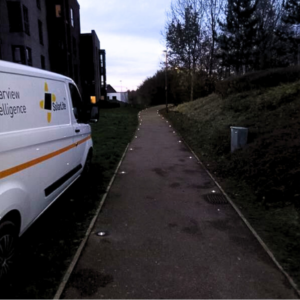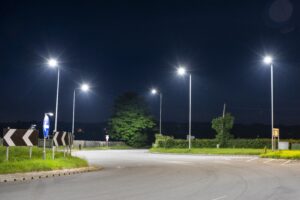New lighting has been installed at highways depots in North Yorkshire as part of a commitment to reduce energy use and tackle climate change while also protecting the natural environment.
In a bid to improve energy efficiency, we have replaced all standard light fittings at our network of highways depots with LED lighting.
The new technology has been introduced in the depots’ salt barns and workshop areas, as well as outside in the maintenance yards and car parks.
The move is set to make tens of thousands of pounds in savings by reducing the amount of energy used and helping alleviate pressure on council budgets amid the rising cost of bills.
While the new lighting will help cut energy bills, efforts have been made to ensure that it does not impact on the environment, especially at night.
Both the North York Moors and Yorkshire Dales National Parks were awarded International Dark Sky Reserve status in 2020 because of the low levels of light pollution.
The International Dark-Sky Association granted Reserve status to both areas, which combined cover more than 1,350 square miles of northern England.
It was by far the biggest such announcement in the UK and represented one of the largest areas in Europe to be simultaneously designated.
It meant the Dales and the Moors joined an exclusive club of other locations such as the Grand Canyon and Death Valley National Parks in the United States of America, Mont-Mégantic National Park in Canada and NamibRand Nature Reserve in Namibia with similar protection.
The new external LED lighting at the highways depots, several of which are located in deeply rural locations, is a direct replacement of existing fittings to maintain the same level of brightness.
At the depot in Thirsk, which sits on an industrial estate on York Road, the 96 existing lights were replaced with 32 LED alternatives.
Based on six hours a day usage, it is anticipated to generate annual savings of £6,319, and annual carbon dioxide reduction of 5,835kg. The cost of the works was £15,000, and this is set to be paid back in under two-and-a-half years.
Executive member for climate change, Cllr Greg White, said: “We want to ensure that we play our part in tackling the international climate emergency and we know that the installation of energy-efficient LED lighting is a great step to achieving this goal.
“The installation promises huge savings in the long-term. The reduced number of LED light fittings required will save on current maintenance costs, and we anticipate the payback period to be a few years at all of the depots.”
North Yorkshire has seven primary highways depots and its salt barns have a capacity for about 55,000 tonnes of salt, which is bought locally from Boulby Potash Mine, near the coast on the outskirts of Staithes. The county council’s fleet of 79 gritters treat almost 3,000 miles – 54 per cent – of the total road network and in a typical season make 6,600 runs.
NY Highways, which was created in June 2021 to give the county council greater control and flexibility over its highways service delivery in the management of one of the largest networks of roads overseen by a local authority in England, recently invested more than £2million in new gritters for its modern fleet including two electric-bodied gritters.
The executive member for highways and transportation, Cllr Keane Duncan, said: “We employ hundreds of staff in the highways department to ensure the smooth delivery of our highways service. Our gritting crews go out in all weathers and at all hours so good lighting is essential to day-to-day operations.
“This is just another example of how we are moving to a more environmentally-friendly way of working. It’s been a large-scale project for our officers to carry out, but it is a worthwhile investment as we will see huge cost savings for years to come.”
























